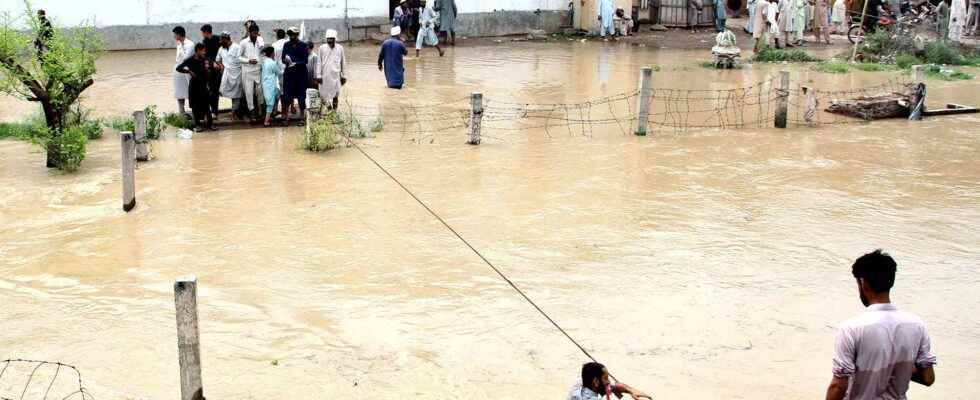Worst episode that the country has ever known in thirty years in view of the damage caused, the floods have affected tens of millions of Pakistanis, killing more than 1,000 of them and destroying nearly a million homes since June.
Torrential rains that battered the small village of Panjal Sheikh in southern Pakistan brought down its houses one by one and flooded the vast farmland around it, plunging its inhabitants into despair. After two weeks of incessant rain, nothing remains but damaged walls and piles of personal belongings floating in puddles of brownish water and gray mud.
Residents of Panjal Sheikh, located less than 25 kilometers from the banks of the mighty Indus River, which crosses the country from north to south, have been hit hard by monsoon weather that has hit a third of the country. Worst episode the country has ever known in thirty years in view of the damage caused, according to the authorities, the floods have affected tens of millions of Pakistanis, killing more than 1,000 of them and destroying nearly a million homes since June.
“When it started to rain, everything started to be destroyed everywhere,” one of its residents, Mukhtiar Ahmed, told AFP on Sunday. “We rushed to try to save children in a house that was collapsing, when another house fell in turn, then another,” he said. “The whole village was wiped out.”
Pakistan is regularly plagued by heavy rains during the monsoon season, which usually starts in June and ends in September. Often destructive, they are also essential for irrigating crops and replenishing water resources.
But the extent of the damage observed this year is unheard of for thirty years, insisted the Prime Minister, Shehbaz Sharif.
Pakistani authorities blame climate change for increasing the frequency and intensity of extreme weather events around the world.
“Erased Village”
The relentlessness with which the bad weather hit the locality surprised the chief of the village of Panjal Sheikh, Ghulam Rasool, 80 years old.
“We heard a huge noise suddenly, and we didn’t immediately understand what was happening,” said the old man who believed that his son’s house had collapsed and that its four occupants were deceased. It was actually the sound of torrents of water pouring down.
He was not at the end of his surprises. While the family tried in vain to prevent the water from invading their land, Mr. Rasool’s daughter gave birth.
“I felt pain, but I was afraid to talk about it. I finally told my mother,” said Naheed Sheikh, 30.
In the pouring rain, her family finally managed to take her to a poorly maintained hospital where she gave birth by Caesarean section. But his ordeal did not stop when he returned home.
“I was half asleep in my room… when we felt the room was rocking,” she told AFP. “I rushed outside with my daughter in my arms when the walls came crashing down as we were walking out.”
At the end of the thirteen days of rain, Mr. Rasool surveyed what was left, stumbling over piles of straw, family belongings and piles of firewood whose sale allowed him to make ends meet.
The man undertook to knock down the fragile walls still standing so that they would not fall on passers-by. “Everything is destroyed. We can’t even cook,” he lamented. “We are in great pain and are waiting for someone to help us.”
Many flood survivors like in Panjal Sheikh traveled to the nearby larger town of Sukkur in hopes of getting help. Some took shelter in crude plastic tents along an elevated road.
As two army trucks passed carrying food, sacks of wheat, tents and cooking pots, the crowd rushed in their direction. Some desperately tried to climb into the trucks, struggling to reach his load. The soldiers shouted at them to form a line, but few listened.
